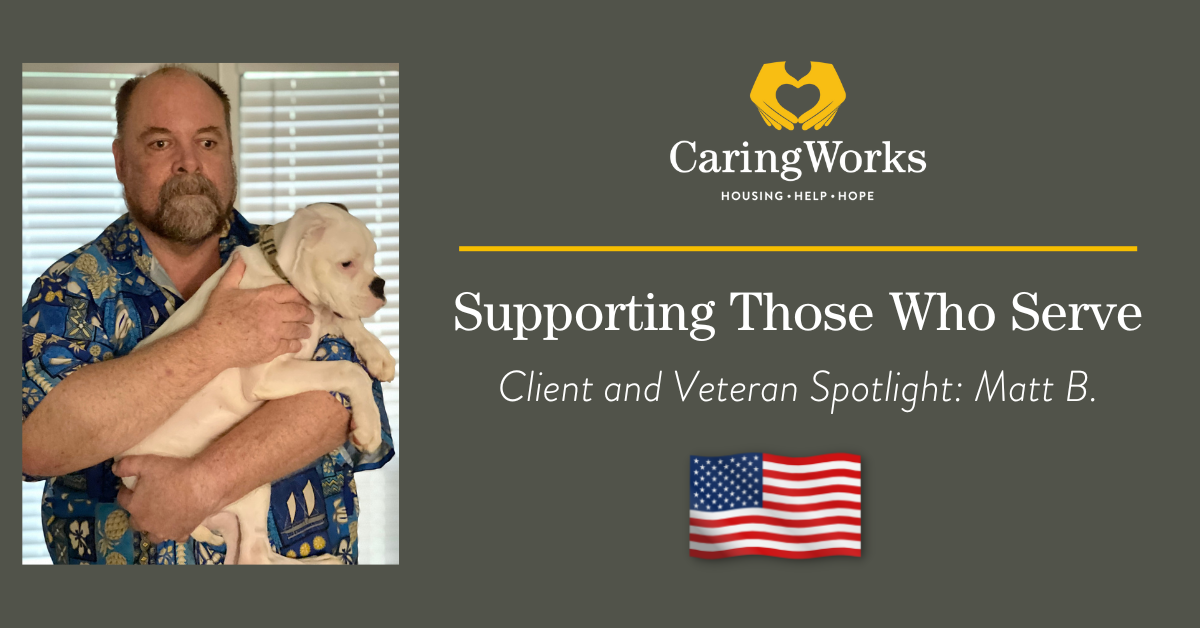Supporting Those Who Serve

For Matt B., the importance of serving others was ingrained in him since childhood.
“My dad was a veteran, and my mom was an ER nurse for 45 years. We were taught to be of service to others and our community.”
At just 18 years old and following in his father’s footsteps, Matt enlisted in the Army and attended intense training to become a paratrooper.
“My dad was a WWII paratrooper. I thought if he can, I can.”
For 20 years Matt served in the military; five years on active duty and the remainder of his service was in the Army National Guard. In the 1980s, Matt was involved in military operations in Grenada and Panama, and even in non-combat situations, he has experienced and witnessed distressing events as a member of Fort Bragg’s 82nd Military Police Company.
“I saw a fair amount of messy stuff,” he said. “Traffic accidents, fatalities, there’s a lot more than just combat.”
While in the Army National Guard, Matt attended the University of West Georgia where he received bachelor’s and master’s degrees in psychology. Later, Matt moved out west and eventually landed in a small Idaho town where he worked as a licensed substance abuse counselor.
“I came from a family with a problem with drinking. Not so much my own, but I saw it and I thought, ‘Yeah, folks need help with this.’”
As a counselor Matt also served as an expert witness for various court matters in his community. Additionally, he was a member of the city council, and he was a volunteer firefighter. But then, as a result of his military service and other trauma, Matt started having symptoms of depression and anxiety, and he was diagnosed with Post Traumatic Stress Disorder (PTSD).
“Being raised by a WWII vet, I knew a lot about PTSD from growing up with it. But my family took the approach that you don’t give credence to it, you just keep going.”
After a tough divorce, Matt moved back to Georgia in 2017 and found himself homeless, and in a deep depression trying to cope with the loss of life he witnessed and other trauma he experienced throughout his life. He knew he had to confront his past, and his mental health struggles.
Losing people really got me to where I felt like I was in a hole with my depression. I was just overwhelmed,” he said. “Being so active helped me keep a lid on it, but once I moved back and that ended, the PTSD got bad.”
Matt connected with the Department of Veterans Affairs (VA) Medical Center in Atlanta, entered its domiciliary program, and began receiving mental health services. In 2019 the VA connected Matt with CaringWorks for housing support. Last year, Matt’s support network expanded again to include man’s best friend: his emotional support dog Ruckus.
“She provides a lot of love and connection,” Matt said. “It’s been the best therapy I could ask for. She keeps me going. It’s a healing thing.”
Ruckus also helps Matt manage another difficult reality of living with PTSD: nightmares.
“She knows me well enough where she’ll start licking my face. She knows how to get me up.”
Though Matt still faces challenges, he is comforted by the support he gets from CaringWorks, as well as his church community.
“It means a feeling of safety. I’m not in this with just me and my dog. There are people who care about me and I can be myself with them if I’m having a bad day.”
Matt wants other veterans to know how important it is to seek help, and that it’s nothing to be ashamed of.
“Most people have some stories even if they’re non-combat vets. You come back to civilian life, and you’re like ‘How do I explain this to people?’ A lot of folks just bury it, but you have to reach out for help. You can’t do it on your own. You can hold it for a while but eventually you’re going to need help.”
Matt also encourages others to have compassion for those who find themselves homeless, recognizing that it can happen to anyone.
“People want to put homeless people in certain categories. But go through a divorce where you lose all your finances, or experience a big injury or a sickness, and it can literally happen to anyone,” he said. “Recognize that there are people of value who still have tremendous skills and lots of ways they can contribute and be an asset in their communities.”
About CaringWorks:
Built on the single idea that all people—no matter their social or economic standing—should have a chance to improve their quality of life, CaringWorks has served 10,000 clients throughout our 20-year history. Since our inception, we have grown exponentially to become one of Georgia’s leaders in providing permanent supportive housing. We serve hundreds of individuals each year through unique programs and services that are specifically tailored to the needs of those facing chronic homelessness.
Donate today to help us end homelessness.
November 2022
